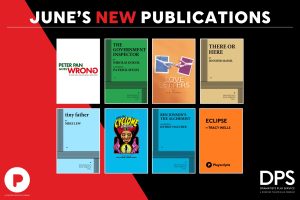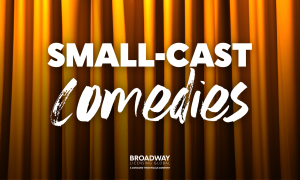As the big day of the Tony Awards® approaches, there’s no better time to immerse yourself in the brilliance of stagecraft. Dive into the magical world of theatre with our curated collection of enchanting theatre-themed titles!
Musicals
After Midnight conceived by Jack Viertel
Welcome back to that electrifying time when Harlem’s Cotton Club was the place to be. Winner of the 2014 Tony®, Drama Desk, Outer Critics Circle, and Astaire Awards for Best Choreography, After Midnight is the smash-hit musical that celebrates Duke Ellington’s years at the famed club. Combining the big-band songs of Duke Ellington, Jimmy McHugh, Dorothy Fields and Harold Arlen, this musical revue is framed by the poetry of Langston Hughes.
Chaplin, Music, Lyrics & Books by Chris Curtis, Book by Thomas Meehan
Chaplin is based on the real-life story of Charlie Chaplin, the iconic film actor, writer, producer and director. The new musical spans the comic’s entire career, from Chaplin’s first performance as a child in 19th-century London to his tearful acceptance of an honorary Academy Award in 1972. The show documents the beloved actor’s rise to fame and the people who shaped his life, including his mother Hannah, his older brother Sydney, his fourth wife Oona O’Neill and gossip columnist Hedda Hopper. The musical dramatizes the making of Chaplin’s legendary films, including The Kid, The Circus, Modern Times and The Great Dictator as well as his turbulent childhood, frenzied love life and political beliefs. Featuring an original score by Christopher Curtis, including “Look at All the People,” “Just Another Day in Hollywood” and “This Man,” Chaplin tells the touching story of the man who makes the world laugh as his legendary screen persona, the Tramp, but struggles to find happiness in his own life.
The People in the Picture, Book & Lyrics by Iris Rainer Dart, Music by Mike Stoller and Artie Butler
Once the creator and star of Yiddish musical films in Poland between the wars, Raisel is now a grandmother (Bubbie) in ’70s New York. Bubbie longs to tell the stories of her acting troupe’s successes and heroism to her granddaughter Jenny. Sadly, her TV-comedy-writer daughter, Red, insists on leaving the past behind, unless Bubbie will talk about the events that have plagued them both since Red’s childhood.
Plays
The Understudy by
Franz Kafka’s undiscovered masterpiece in its Broadway premiere is the hilarious and apropos setting for Theresa Rebeck’s exploration of the existential vagaries of show business and life. Charged with running the understudy rehearsal for the production, Roxanne finds her professional and personal life colliding when Harry, a journeyman actor and her ex-fiancé, is cast as the understudy to Jake, a mid-tier action star yearning for legitimacy. As Harry and Jake find their common ground, Roxanne tries to navigate the rehearsal with a stoned lightboard operator, an omnipresent intercom system, the producers threatening to shutter the show and her own careening feelings about both actors and her past. Will the show go on? The Understudy is a dazzling and humanistic look at people trying to do what they love in the face of obstacles that mount until all anyone can do is dance.
Act One by James Lapine, from the autobiography by Moss Hart
Growing up in an impoverished family in the Bronx, Moss Hart dreamed of being part of the glamorous world of the theatre. Forced to drop out of school at age thirteen, Hart’s famous memoir Act One is a classic Hortatio Alger story that plots Hart’s unlikely collaboration with the legendary playwright George S. Kaufman. Tony Award-winning writer and director James Lapine has adapted Act One for the stage, creating a funny, heartbreaking, and suspenseful play that celebrates the making of a playwright and his play Once in a Lifetime. Act One offers great fun to a director to utilize over fifty roles, which can be played by a cast as few as twelve, and in a production that can be done as simply or elaborately as desired.
The One-Act Play Disaster by Don Zolidis
Pulling off a heist is pretty tough. But that’s nothing compared to pulling off an unauthorized adaptation of a popular heist movie onstage. Everything that can go wrong, will go wrong when you’ve got a light board operator out for revenge, a dollar-store set, and a cast that’s a total mess. The smooth-talking con man has crippling stage fright, the acrobat is completely uncoordinated, and the understudy keeps reading all the stage directions out loud. Can the group survive a run-through? It might be a total disaster, but it will definitely be hilarious.
Yellow Face by
The lines between truth and fiction blur with hilarious and moving results in David Henry Hwang’s unreliable memoir. Asian-American playwright DHH, fresh off his Tony Award win for M. Butterfly, leads a protest against the casting of Jonathan Pryce as the Eurasian pimp in the original Broadway production of Miss Saigon, condemning the practice as “yellowface.” His position soon comes back to haunt him when he mistakes a Caucasian actor, Marcus G. Dahlman, for mixed-race, and casts him in the lead Asian role of his own Broadway-bound comedy, Face Value. When DHH discovers the truth of Marcus’ ethnicity, he tries to conceal his blunder to protect his reputation as an Asian-American role model, by passing the actor off as a “Siberian Jew.” Meanwhile, DHH’s father, Henry Y. Hwang, an immigrant who loves the American Dream and Frank Sinatra, finds himself ensnared in the same web of late-1990’s anti-Chinese paranoia that also leads to the “Donorgate” scandal and the arrest of Los Alamos nuclear scientist Wen Ho Lee. As he clings to his old multicultural rhetoric, this new racist witch hunt forces DHH to confront the complex and ever-changing role that “face” plays in American life today.
The Nance by
In the 1930s, burlesque impresarios welcomed the hilarious comics and musical parodies of vaudeville to their decidedly lowbrow niche. A headliner called “the nance” —usually played by a straight man—was a stereotypically camp homosexual and master of comic double entendre. The Nance recreates the naughty, raucous world of burlesque’s heyday and tells the backstage story of Chauncey Miles and his fellow performers. At a time when it was easy to play gay and dangerous to be gay, Chauncey’s uproarious antics on the stage stand out in marked contrast to his offstage life.
Evening at the Talk House by
To celebrate the tenth anniversary of the opening of an unsuccessful play, the playwright, the leading actor, the producer, and various other members of the company get together at their former haunt, the Talk House. Most haven’t been there, or even seen each other, in years, and the gossip and nostalgia are mixed with questions and accusations. Why does a washed-up old actor keep getting beaten up by his friends? Where does a failed actress-turned-waitress disappear to for months at a time? Evening at the Talk House is a biting portrayal of people grasping to find their place in a world in which terror has become an accepted part of life. Is this the world we’re living in now?
The Grand Manner by
In 1948, playwright A.R. Gurney, then a young boarding-school student, traveled to New York where he attended a performance of Shakespeare’s Antony and Cleopatra, going backstage afterwards to meet the production’s star, the great stage actress Katharine Cornell, who was dubbed “The First Lady of the American Stage” by the legendary critic Alexander Woollcott. A mix of remembrance and imagination, THE GRAND MANNER is a love letter to this fabled actress and a heartfelt look back at the glorious heyday of the Broadway theatre.
Shows for Days by
It’s May 1973 when a young man wanders into a dilapidated community theater in Reading, PA. The company members welcome him—well, only because they need a set painter that day. The young man then proceeds to soak up all the idealism and the craziness that comes with being part of a struggling theater company with big dreams. When a playwright looks back at his beginnings in the theater and decides to chronicle those experiences in a play, all sorts of things can happen. If you’re Douglas Carter Beane, who grew out of his Reading, PA, community theater days to become one of the stage’s master writers, it’s bound to bring a measure of gimlet-eyed reflection, a large dollop of self-deprecation, and a heaping dose of hilarity.
Red Rex by
The sixth play in Ike Holter’s Rightlynd saga. Red Rex is a scrappy theater company that is on the brink—will they have the hit that puts their name on the map, or the wake-up call that it’s time to throw in the towel? A prodigal son actor and amateur neighborhood talent join the stage to perform a play that may or may not be based on a true story. Internal drama threatens to complicate the production further, causing fireworks both on and offstage. What else could go wrong? Complex and thought-provoking, RED REX asks us: What are we willing to sacrifice to share stories that must be heard, and where do we draw the line?






